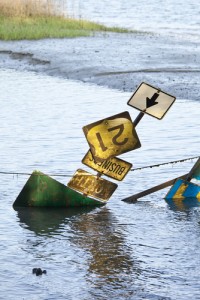By Kent Page McGroarty
Many plan for disasters expecting they’ll be home when the worst happens. This is not always the case! Often times a natural disaster hits and people are at work, school, vacation, etc. In addition to creating preparedness kits and plans for the home, it’s also important to know what to do when you aren’t home during an emergency. Let’s take a look at a few tips to ensure you remain safe:
Communication
If possible, one of the first things if not the first thing to do during an emergency is to contact family and friends. Let them know where you are, how far you are from home, and how you plan to get home. This saves them from leaving the home base to come look for you, or otherwise worrying. Call, text, email–whatever you can do.
Identify Escape Routes
Wherever you go on a daily basis, whether it be work, school or somewhere else, it’s a good idea to know exactly where all emergency exits and escape routes are located. Have a plan concerning which exits to use and which exits to avoid in the event of a disaster.
Find Safe Places
Sturdy furniture, such as heavy desks, are helpful in terms of safe cover, as are closets that don’t feature lots of heavy items on shelves. If nothing else, crouch next to an interior wall and stay the heck away from windows.
Perform a Few Maintenance Tasks
Assuming it’s feasible (and allowed) consider performing a few maintenance tasks at your work site should disaster strike. This includes bolting bookshelves and other top-heavy furniture to walls, and moving all weighty items to bottom shelving. Also take time to look around for other potential hazards and what can be done about them.
Create an Emergency Kit
More than one emergency kit is never a bad thing, especially when one’s at home and the other in your workplace or vehicle. While your “on the go” kit doesn’t have to be as detailed as the one at home, it still helps to have an extra flashlight or two, emergency contact numbers, water bottles, non-perishable food sources, batteries, a radio, flares and anything else you’d like to include. Keep it safe in the trunk of your car or in a trusted spot at work.
Have you ever been caught in a disaster while far from home? What was your experience like? Share your stories and tips in the comments section!

